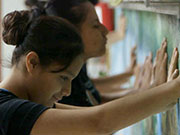Ballet helps the blind improve mobility & confidence in Mexico

 0 Comment(s)
0 Comment(s) Print
Print E-mail CNTV, October 13, 2016
E-mail CNTV, October 13, 2016
In Mexico, a group of young women are practicing ballet. But they're not just dancing to impress the audience. They are improving their mobility and gaining confidence and doing it all without sight.
Every Saturday, Lorena Nivea embarks on a two- hour journey from Puebla to Mexico City to teach ballet. But this is not a typical class, her students are a group of young blind women who are using ballet as type of therapy to help them gain confidence and self- worth.
"They have to learn to see in other ways and then comes this artistic experience that helps them with their esteem," said Lorena Nivea, int'l coordinator of Psicoballet.
In 1973, the program was launched by a Cuban psychologist, Georgina Farinas Garcia. Using a psychotherapeutic approach through dance, Garcia wanted to help people with behavioral disorders.
Today, the dance is taught to people with all types of disabilities and has spread to 17 countries. But what is most striking is the innovative ways it teaches people who are handicapped.
Lorena Nivea said, "You can't teach them ballet in the same way you teach a person who sees. They need to touch things. They needs things to help guide them into getting into the correct position or to make the proper movements."
This ballet program initially started as a therapeutic exercise. Now two years later, this group is performing professionally in front of audiences across Mexico.
16-year-old Yiretzi Romero says the program has helped her not only with her self-esteem but has also helped increase her mobility.
She said, "At first, it was very hard. It was hard to get use to it. It was hard to me to stretch and not bump into the other girls when I was walking. Physically, it has helped have better posture, to stretch better and correct my positions, the way I walk and sit."
But for Lorena Nieva, the most rewarding part of the class is that they have become respected as ballerinas.
She said, "They always tell me they would have never imagined that they would ever be on stage. To be blind and be doing ballet so in a way it's not about therapy anymore. They have already passed that. Now they have the emotional confidence to perform."





